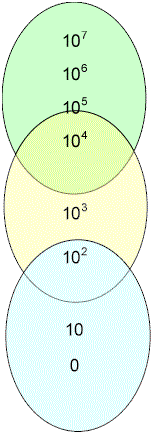Home
Revision
Advanced Syntax
Using Fields
Invisible Web
Task List
EBM Top 10
Search Engines
AltaVista
Ask Jeeves!
Excite
Fast
HotBot
Infoseek
Lycos
Northern Light
Oingo
WebCrawler
Metasearch
Dataware
Dogpile
Inference Find
Ixquick
MetaCrawler
Simpli
Directories
Argus
Clearinghouse
Open Directory
Yahoo
About
Looksmart
Internet Public
Library
Infomine
WWW Virtual
Library
Invisible Web
Lycos Databases
Search IQ
The Big Hub
The Invisible Web
Revision
The first workshop ensured that you had the necessary skills (Win 9x and browser) to navigate the Internet. There was a description of how search engines work, and the difference between directories and search engines.
Recognising that there was no single all-purpose tool for searching the Internet, efforts were made to learn an effective general purpose search strategy. A basic search strategy was outlined, which aimed to satisfy 80% of your searches within about five minutes.
The strategy required you to classify your question into one of three categories (concept, specific topic or fact) on the basis of the 'broadness' of the question and also on the basis of the possible number of web pages which might be out there. Having decided which type of question you were asking, a hierarchy of search tools was recommended.
Table 1. Recommended search strategy
| Category | Description | Number of web pages you imagine to be on the web | Tool | Recommendation |
Concept Topic |
Broad Area (like a book or a large chapter) |
 |
Directories
Search engines with thesaurus or meaning based searching Metasearch engines Full text indexed search engines Natural language query search engines On-line databases |
Yahoo Open Directory About Argus Clearinghouse Librarians' Index to the Internet Internet Public Library WWW Virtual Library Excite Lycos Oingo Ixquick |
Conducting the Search
Four steps were proposed in conducting the initial search
![]() Rule 1: Be as specific as you can (minimum of three keywords)
Rule 1: Be as specific as you can (minimum of three keywords)
![]() Rule 2: Know which search
engines/directories are best suited to your question
Rule 2: Know which search
engines/directories are best suited to your question
![]() Rule 3: Perform your search in several
search engines simultaneously
Rule 3: Perform your search in several
search engines simultaneously
![]() Rule 4: Log off and analyse your
search results before clicking on the links
Rule 4: Log off and analyse your
search results before clicking on the links
Refining the Search
If the initial search did not reveal any promising links in the first ten results from each search engine, it was suggested that it is better to refine your search rather than trawling through pages of results in the hope of finding the one you want. The methods suggested, in approximate order of usefulness are listed below.
Search technique |
Description |
| Use as many terms as possible search engine guide tutorial |
Be
specific - use several words, separated by spaces. It is very rare to find no hits because
you have typed in too many words. It is all too common to find many thousands of hits
because you have not typed in enough. Remember also that nouns are the most powerful words for searching purposes. Check your spelling, and remember American variants. The most important keywords should be first (i.e. on the left) as the search engine determines the ranking order of the results by reading your search string from left to right. |
| Use phrases "search engine" guide tutorial
|
Phrases
(words grouped together within apostrophes) are useful if the words need to appear
together rather than separately on the page. If you don't want a phrase, but you think that the words should appear close together, then AltaVista offers a 'near' facility |
| Use search engine arithmetic
|
(+)
before any word means that it must be included (-) before any word means that it must be included NB exercise caution when using the minus sign, as it can unintentionally eliminate a lot of good hits. I use a minus mainly when I am getting a lot of hits on a completely unwanted subject, and I choose the minus word very carefully |
Truncation/wild cards math* for maths, mathematics, mathematical colo*r for color and colour |
(*) is a
wildcard, meaning a placeholder for zero or more unknown characters. It is useful for:
The longer the stem, the better, as a short stem (e.g. ast*) could produce hits for asthma, asthenia, asterisk etc. |
Parentheses "search engine" and (tutorial or guide) |
Using a
combination of Boolean logic and parentheses you can construct very complex queries. Beware - parentheses can have unexpected results on the way search engines rank pages. There will be further discussion on parentheses in the Complex Query page. |
Fields
domain:uk
+medical +"search engine" host:doh.gov.uk
+"clinical governance" |
Fields specify where the search words must appear within the web page. You will
have to consult the help file for each search engine to use this, as each engine offers
different fields. title: page title must contain this text
host: page must be located on a specified server e.g. if you want to search the Department of Health server you would use host:doh.gov.uk image: page must contain an image whose file name contains the specified text url: pages with specified text anywhere within the url, e.g. url:uk will find http://www.doh.gov.uk/dhhome.htm as well as http://www.uk/ link: page must contain a hyperlink for which at least one of the words in the destination address begins with specified text text: text on the page must contain search words |
If you are still having problems with your search despite these techniques then the following tutorial should be of benefit. It covers advanced syntax (including Boolean logic) and the use of specialist search engines and on-line databases.
Raouf Allim
22 Benjamin Road
High Wycombe
Bucks. HP13 6SR
raouf@allim.tc
2nd August 2000